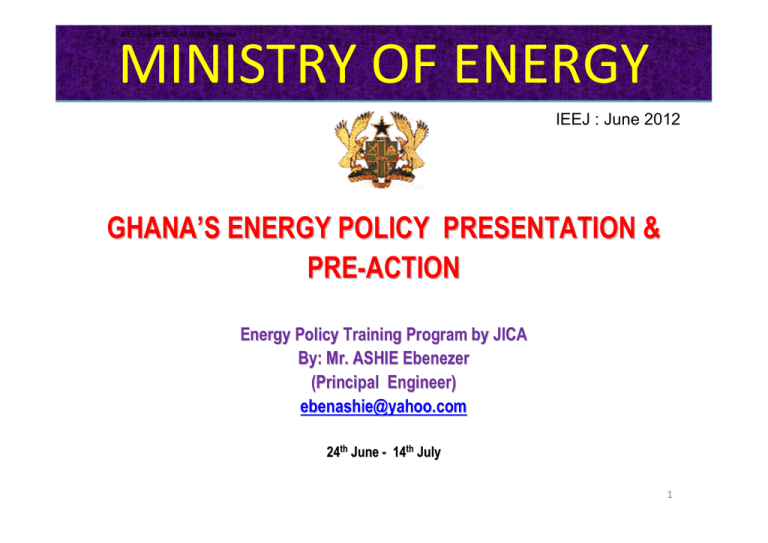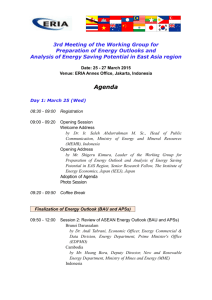
IEEJ: August 2012 All Right Reserved
MINISTRY OF ENERGY
1
IEEJ : June 2012
GHANA’S ENERGY POLICY PRESENTATION &
PRE-ACTION
Energy Policy Training Program by JICA
By: Mr. ASHIE Ebenezer
(Principal Engineer)
ebenashie@yahoo.com
24th June - 14th July
1
IEEJ: August 2012 All Right Reserved
Outline •
•
•
•
•
•
Overview of Ghana
Ghana’s Development Challenge
The Energy Resources and Vision
Energy Policy Platform
Major Difficulties
Interested Subjects
IEEJ: August 2012 All Right Reserved
OVERVIEW OF GHANA ‐ Land Area: 238.5 km2
‐ Population: 24,658,823 (2010)
‐Electricity Access: 72% (2011)
‐GDP Growth Rate: 7.7%
Major Export: Cocoa, Gold, Timber, Bauxite, & Oil
IEEJ: August 2012 All Right Reserved
THE ENERGY RESOURCES AND VISION
• Ghana is well endowed with a variety of energy resources including biomass, biomass hydrocarbons, hydropower, solar and wind. It has the capacity to wind
produce modern bio‐fuels and is exploring options to develop nuclear energy. • The energy sector vision is to develop an “Energy Economy” to secure a reliable supply of high quality energy services for all sectors of the Ghanaian economy and also to become a major exporter of oil and power by 2012 and 2015 respectively
IEEJ: August 2012 All Right Reserved
GHANA’S DEVELOPMENT CHALLENGE
• Ghana’s total energy supply has to grow significantly to help achieve the development agenda goal. • The challenge is how to increase the energy supply and also expand the energy infrastructure in the country in a way that is sustainable. IEEJ: August 2012 All Right Reserved
GHANA’S DEVELOPMENT CHALLENGE
Achieve Universal Access to modern energy forms by 2020
•Ghana is predominantly a woodfuel‐based Energy economy
Universal access to electricity and high penetration of LPG to substitute for woodfuels
6
IEEJ: August 2012 All Right Reserved
GHANA’S DEVELOPMENT CHALLENGE
• The share of modern renewable energy
technologies (Wind, Solar PV, hydro below
100MW, Bio-fuel) for electricity is however very
negligible (<0.1%).
IEEJ: August 2012 All Right Reserved
SHARE OF GRID ELECTRICITY SUPPLY TO THE DEMAND SECTORS SINCE 2008
Industrial
Year (Gwh)
Non Residential
(% Share) (GWh)
(% Share)
Residential
(GWh)
(% Share)
Total 2008
2966
48.1 928
15.1 2269
36.8 6163
2009
2943
47.2 978
14.1 2408
38.7 6229
2010
3156
46.6 966
14.3 2738
40.7 6772
8
IEEJ: August 2012 All Right Reserved
ENERGY POLICY PLATFORM
Power Sub‐sector;
Petroleum Sub‐sector;
Renewable Energy Sub‐sector;
Waste‐to‐Energy;
Energy Efficiency and Conservation; Energy and Environment;
Energy and Gender; and Managing the future of the sector.
IEEJ: August 2012 All Right Reserved
MEDIUM POLICY TERM FOCUS Increase access to adequate, reliable and
economically priced modern forms of energy supply
Diversify the national energy mix including the use
of environmentally friendly indigenous sources of
energy
Ensure efficient management of the energy sector
Ensure productive and efficient use of energy
Promote Private Sector Participation in the energy
sector
10
IEEJ: August 2012 All Right Reserved
POWER SUB SECTOR
Issues
Policy Goals
Power supply shortages:
Increase power generation capacity
frequent interruptions
Inadequate access to
electricity – 72% national
access
Poor financial health of
Utility Companies -
to 5,000 MW by 2015
Improve and modernise distribution
infrastructure and reduce system
losses: 25% to 18% by 2015
Develop a non-constrained
transmission network by 2015
Achieve universal access by 2020
and at least 80% national access
by 2015
Restore financial health of Utility
Companies by achieving costefficient tariffs by 2015
Strengthen Regulatory Agencies
11
IEEJ: August 2012 All Right Reserved
RENEWABLE ENERGY
Issues
Low level in Renewable Energy
in National Electricity mix.
Policy Goals
Increase Renewable Energy in the
Supply-mix to 10% by 2020
Promote exploitation and use of
mini-hydro, solar and wind
Promote efficient utilization of
Over dependence on woodfuel
and its inefficient utilization
woodfuels and alternative cooking
fuels such as biogas, LPG etc
Support private sector investment
Potential for Bio-fuels
production for job creation and
export
in biofuel production
Balance bio-fuel development
against food security
IEEJ: August 2012 All Right Reserved
POLICY DIRECTIONS ‐ PETROLEUM SECTOR
Issues
Inadequate exploration, development and production of oil and gas resources of Ghana
Maximise the benefits of exploration, development, production and utilisation of oil and gas to Ghanaians Limited availability of petroleum products to consumers Policy Goals
Sustain and optimise the exploitation and utilisation of Ghana’s oil and gas endowment for the overall benefit and welfare of all Ghanaians, present and future
Facilitate the universal access to adequate, reliable and cost effective petroleum products such as Liquefied Petroleum Gas (LPG).
13
IEEJ: August 2012 All Right Reserved
FUTURE POWER DEMAND & SUPPLY
14
IEEJ: August 2012 All Right Reserved
MAJOR DIFFICULTIES Inadequate human resource capacity and logistical support for the implementation and monitoring of the Energy Policy;
Inadequate interaction between the Ministry of Energy and relevant Ministries, Departments and Agencies, Traditional Authorities, Members of Parliament, District Assemblies to discuss issues relating to the National Energy Policy; Inadequate personnel at Policy, Planning, Monitoring and Evaluation Divisions of relevant Ministries, Departments and Agencies
15
IEEJ: August 2012 All Right Reserved
Interested Subjects
Demand & Supply forecasting
Energy Economic
Learn from Japan’s experience in Energy
Policy Formulation
IEEJ: August 2012 All Right Reserved
THANK YOU
Contact : report@tky.ieej.or.jp
17





